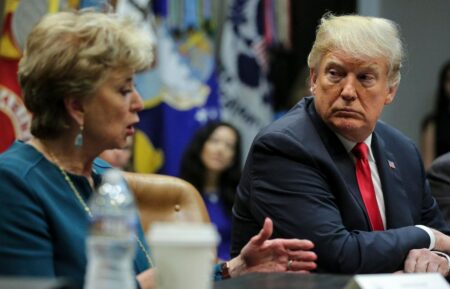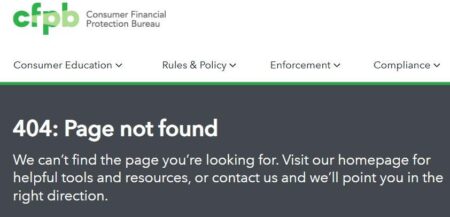The U.S. Department of Education is experiencing major turmoil as the Trump administration takes steps to undermine and eliminate it. Millions of student loan borrowers, including those pursuing student loan forgiveness, may potentially be impacted.
Last week, the Department of Government Efficiency, or DOGE, headed by Elon Musk, reportedly gained access to sensitive systems at the department, including data sets that contain personal identifying information for millions of federal student loan borrowers and aid recipients. This week, in response to a DOGE review, the department cancelled nearly $900 million in contracts, with more potential cuts on the way. And President Trump is expected to unveil an executive order later this month that will call on the department to be reduced and ultimately eliminated.
Online rumors are wildly circulating, primarily on social media platforms like TikTok, that the upheaval at the Department of Education may provide grounds for borrowers to receive or request student loan forgiveness. But that is not the case. Here’s what borrowers need to know.
No Student Loan Forgiveness Under FERPA For Data Exposure
One of the online rumors circulating among borrowers on social media platforms is that DOGE’s access to Department of Education data systems, including the sensitive personal data of millions of borrowers, is a violation of Family Educational Rights and Privacy Act, a federal law often referred to as FERPA. Some online influencers are suggesting that the violation provides a basis for borrowers to request or receive student loan forgiveness, such as by submitting a dispute to their loan servicer or filing a lawsuit against the Department of Education.
FERPA is a federal law enacted in 1974 to protect the exposure of personally identifiable information in a student’s education record, such as Social Security numbers and dates of birth. Disclosure of FERPA-protected data is only permissible under limited circumstances. But a FERPA violation provides no basis for student loan forgiveness. FEPRA does not have a “private right of action” – meaning individual student loan borrowers do not have the legal right to file a lawsuit due to a FERPA violation. And student loan forgiveness is not a remedy for any FERPA violation, nor does a violation invalidate a borrower’s student debt or their associated obligations.
“FERPA’s nondisclosure provisions contain no rights-creating language, they have an aggregate, not individual, focus, and they serve primarily to direct the Secretary of Education’s distribution of public funds to educational institutions,” said the Supreme Court in Gonzaga University v. Doe, a 2002 case that definitively held that individuals cannot file a lawsuit to recover due to a FERPA violation.
A borrower’s only real recourse under FERPA would be to file an administrative complaint with the Department of Education. But since the Department of Education is controlled by the Trump administration, which ultimately authorized DOGE’s access of the sensitive data, any such complaint is unlikely to yield results.
Last week, the University of California Student Association filed a lawsuit against the Education Department to halt DOGE’s access to sensitive student loan borrower data files.
“Defendants have violated the applicable statutory and regulatory restrictions by granting DOGE-affiliated individuals access to ED’s sensitive internal systems that house federal student financial aid information,” reads the Complaint. “The scale of the intrusion into individuals’ privacy is enormous and unprecedented. The personal data of over 42 million people lives in these systems,” and DOGE’s “continuous and ongoing access to that information for an unspecified period of time means that millions of Americans from all walks of life have no assurance that their sensitive information—and that of their parents and/or spouses—will receive the protection that federal law affords.”
The lawsuit is seeking injunctive relief (meaning a court order blocking the Department of Education from allowing DOGE to access these systems) under the Privacy Act and the Internal Revenue Code. But the lawsuit is not seeking student loan forgiveness for any borrower, as that is not an available remedy for such violations.
No Student Loan Forgiveness If The Department Of Education Shuts Down
Another rumor circulating online is that if President Trump shuts down the Department of Education, borrowers’ student loan obligations will disappear, and they may even be entitled to student loan forgiveness. That is false, however.
First, it’s important to note that the Department of Education can only be eliminated by Congress. While Republicans have filed legislation to do that, it’s not particularly likely to pass, as it would require Democratic support in the Senate to overcome a filibuster. Student loan borrower advocacy groups have promised to sue the Trump administration if the President tries to eliminate the department via executive action.
Second, even if the Department of Education does get shut down, that does not mean the end of the federal student loan system. Instead, the different components of the department would simply be moved to other federal agencies. For example, a bill filed by Republican lawmakers in the Senate last year would shift the Office of Federal Student Aid, which administers the federal student loan system, to the Department of Treasury.
Regardless of where the federal student loan system ends up, borrowers may experience significant disruptions to federal student loan repayment and federal aid programs. But that won’t extinguish a borrower’s repayment obligation or entitle them to student loan forgiveness.
“Student loans will not go away if the Department goes away,” said the Student Debt Crisis Center in an email to student loan borrowers last month, but a Department of Education shutdown “would harm borrowers even more than the current system.”
Other Student Loan Forgiveness Programs Threatened
For now, borrowers have access to most of the same student loan forgiveness programs that existed previously, including Public Service Loan Forgiveness and Income-Based Repayment. Loan forgiveness under the SAVE plan, as well as the ICR and PAYE plans, remains blocked for now due to a court order associated with an ongoing legal challenge.
However, Republican lawmakers are considering a number of actions to limit or repeal federal student loan forgiveness programs to offset the costs associated with extending tax cuts. This could include the repeal of the SAVE plan and elimination of time-based student loan forgiveness associated with IDR plans, as well as changes to PSLF, Borrower Defense to Repayment, and other federal student loan forgiveness and relief programs that were expanded by the Biden administration.
Read the full article here
















